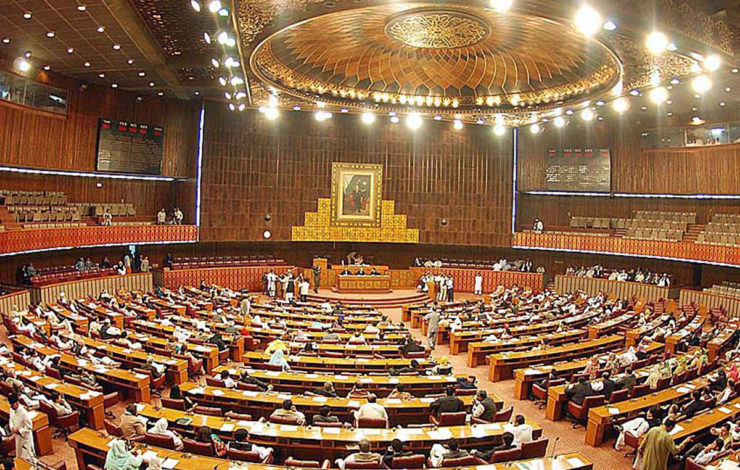
The legislative process in Pakistan gained momentum as the tenure of the National Assembly drew to a close. Two crucial bills were introduced and swiftly passed by both the upper and lower houses of Parliament with minimal debate and a scant presence of lawmakers. Astonishingly, these bills were approved on the very day they were presented, even in the absence of several ministers. Analysts noted that the haste with which the laws were pushed through indicated a foreknowledge that elections might not be held on schedule. As per Pakistan’s Constitution (but not per practice), the amendment acts still required signatures from the President of Pakistan. However, President Alvi claimed that he never signed these Acts into law, although it was reported that the Acts have been passed to become laws.
Alvi’s startling Tweet revealed that he had not signed the bills and had instructed his staff to return them. He expressed his disappointment that his staff had not followed his directive and sought forgiveness from those who would be affected. Let’s dissect the President’s tweet.
According to the Constitution of Pakistan, any bill that has been sent to the President and has not received his assent is returned, accompanied by a letter bearing the President’s signature. Following the receipt of this letter by the Parliament, discussions take place in accordance with the President’s letter. If after these discussions, the bill is once again passed by the Parliament, it is then resubmitted to the President.
President Alvi has omitted any reference to the aforementioned letter, thereby giving rise to numerous questions. Why was this letter not dispatched to the Parliament? Why did the President not overtly convey his disapproval of the bills before their transformation into laws? However, of greater import is the inquiry into the significance of the Official Secrets (Amendment) Act and the Pakistan Army (Amendment) Act.
The Official Secrets Amendment Act 2023 grants intelligence agencies the power to enter and search any location or person without a warrant, using force if necessary. This act allows the seizure of documents, sketches, plans, devices, or anything relevant to suspected offenses. This seriously violates human rights, further bolstering military authority against civilians and journalists. Other amendments include:
- The Official Secrets Amendment Act expands the definition of military installations, now encompassing digital platforms. This extension aims to include individuals like YouTubers and social media influencers under its jurisdiction.
- The term “document” now covers various forms, including electronic, related to military information.
- The definition of “enemy” now includes anyone connected, intentionally or not, to foreign powers or organizations. Unintended connections are treated as seriously as planned espionage.
- Unauthorized disclosure of the identities of intelligence agency members, informants, or sources is now an offense.
- Restrictions on entering prohibited areas, including military installations, are now applicable even during peacetime.
- Capturing prohibited areas through drone photography is now a criminal act.
- Visiting the address of a foreign agent, within or outside Pakistan, is deemed an offense.
- Federal Investigation Agency (FIA) and intelligence agency officials are empowered to investigate violations, led by FIA officers of at least BPS-17 rank.
- Joint Investigation Teams (JIT) can be formed by the FIA Director General, tasked with completing inquiries within 30 working days.
- All materials collected during inquiries are admissible as evidence.
The proposed law appears to be influenced by events on May 9, following the arrest of PTI chief Imran Khan.
The Pakistan Army (Amendment) Act, 2023 grants the Army Chief the power to enforce the Pakistan Army Act, a power previously held by the federal government. This amendment also subjects retired army officials to strict regulations, seemingly aimed at curbing the political involvement of those supporting Imran Khan. The power of martial courts is extended to include former army personnel.
- The Army Chief gains more authority under this amendment.
- Ex-servicemen are barred from politics or ventures conflicting with army interests for a certain period after retirement.
- The amendment introduces imprisonment for defaming the army.
- Individuals subject to the army act are prohibited from engaging in politics for a specific time after retirement.
- Individuals are forbidden from working with entities conflicting with army activities unless approved by the army chief.
- Penalties are imposed for offenses against the armed forces under the Peca law.
- Penalties are also enforced for intentionally undermining the armed forces’ reputation.
- Officers subordinate to the army chief can be delegated powers.
- The laws under this act take precedence over inconsistent laws.
- The army can engage in activities related to national development and strategic interests with relevant authorities’ approval.
The Pakistan Army (Amendments) Act 2023 not only enhances the army’s power but also expands its jurisdiction. The haste, lack of transparency, Alvi’s half-truths, and controversies surrounding the content of these bills and their passage have exposed the façade of democracy, revealing a more sinister agenda at play.
Pakistan’s legislative process resembles a witch trial, with democracy as the accused. The establishment and its puppets have now summoned a census to delay the election. They are resolute in their endeavor to stifle dissenting voices and consolidate power, employing the veneer of democracy as mere kindling to burn away the rights and freedoms of the people. Democracy finds itself as the witch being burnt at the stake, facing the flames of manipulation, suppression, and disregard for its true essence. The time has come for the people to stand as vigilant guardians, lest the ashes of democracy be swept away by the winds of authoritarianism and control.
Taut Bataut – is a researcher and writer that publishes on South Asian geopolitics, exclusively for the online magazine “New Eastern Outlook”.